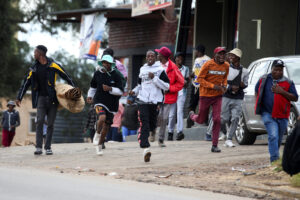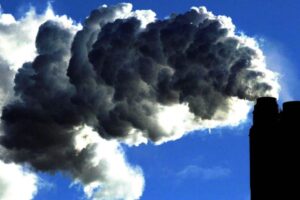Residents of Bibiani, in Ghana’s North region, are demanding that a gold mining company operating in their district relocate their homes to safer locations. Mesin Gold is blasting rocks in the heart of the Bibiani’s Old Town and Zongo neighborhoods, damaging buildings and causing severe noise and air pollution.
Residents say that many children and adults in Bibiani, are suffering from respiratory illnesses which doctors at the local hospital say are a result of sustained exposure to air pollution in the area since Mesin Gold began operating in 2021.
Over the same period, cracks have appeared in the walls of houses in these two neighborhoods, which are located dangerously close to the mining concession. The damage is so severe, that several houses have been marked as unsafe by the Municipal Assembly and scheduled for demolition, though none have yet been torn down.
“We are all ill due to the pollution. Anytime the youths tried to engage the authorities of Mesin Gold on the relocation, the military men providing security to the company attack us, leading to casualties,” Bibiani resident and artisanal gold miner Kwabena Desin told Mongabay.
“Our small scale mining was causing no harm. We have been carrying out our mining activities peacefully till this company showed up.”
Mesin Gold, a subsidiary of mining giant AshantiGold, was awarded a mining concession in Bibiani in 2021. Before this, many young men in the area were operating artisanal mines in the area. They say the company has seized the mining pits they were working in and the army is now denying them access to the sites.
Bibiani Old Town Assemblyman Daniel Kaakyire Addae said the community members have demonstrated and marched to the Bibiani-Ahwiaso Bekwai Municipal Assembly and Mesin Gold’s offices several times to demand relocation to a safe distance from the mine, but so far there has been no response. Instead, Addae says, community members have been harassed by soldiers patrolling the concession’s boundaries.
The chief executive of the municipal assembly, John Koah, said negotiations had advanced and affected households will soon be relocated. “The government is responsible for the relocation which the Regional Minister is currently ensuring that it happens soon.”
However, construction of new homes at the new site, Asikyire Nkwanta, has not yet begun as landowners are demanding compensation for the land to be used.
In March 2023, Cameroon and Equatorial Guinea signed an agreement to exploit a cross-border oil field between the Central African neighbours. The agreement will accelerate development of the Yôyô and Yolanda oil blocks, held by Chevron.
Valentin Mahop, president of an association of fishers and maritime transporters from Manoka, a coastal village in southwestern Cameroon, not far from the important port city of Douala. The association’s members are concerned about the environmental and social impact of the oil and gas industry in the region.
The waters off Yôyô are rich in plant species, notably mangroves, as well as marine fauna like manatees (Trichechus senegalensis), green turtles (Chelovia vydas) and crayfish (Nematopalemon hastatus). The fisheries here, 20 km south along the coast from Manoka, support the livelihoods of some 10,000 people and provide food for many more.
“This exploitation is harmful to the underwater fauna and flora, all the more so as the noise pollution from boats anchored at the base mud is an example of pollution,” Mahop told Mongabay, referring to disturbances caused by exploration and exploitation of oil blocks in the Douala Basin in which Yôyô and Yolanda lie. “All this has led to a drop in artisanal fishing production in recent years. This exploitation will quite simply put an end to this activity.”
The Yôyô oil field is just off the coast of the mangrove forests of Douala Edéa National Park, which extends inland from the sea on either side of the Sanaga River’s mouth.
Environmentalist Béat Marcel, the former national president of the non-profit Cameroon Wetlands Platform, says civil society opposed to expanding oil production in these waters. “I think that to better prepare to cancel this project, it would be important to consult the management plan [of the park], to locate the exact location of the gas and oil fields, to determine the potential impacts of these gas and oil exploitations,” he told Mongabay.
Illegal miners in the Ashanti Region in central Ghana continue to cut down trees, excavate pits, and pollute rivers in the Apamprama Forest Reserve. This is despite a joint military and police operation launched in April 2021 to protect forest reserves from illegal mining.
In his “State of the Nation’s Forests” report on May 2, John Allotey, chief executive officer of the country’s Forestry Commission, said illegal miners are now armed with sophisticated assault rifles and other weapons and are able to outgun law enforcement authorities.
Where illegal miners usually abandon mine sites ahead of visits by law enforcement agencies, resuming their activities after police had gone, in Apamprama, members of Operation Halt II face resistance from miners’ armed guards who sometimes engage in shoot-outs with the taskforce.
Erastus Asare ,Donkor, an investigative journalist with Kumasi radio station Luv FM who has been tracking illegal mining for several years, told Mongabay that illegal activity is ongoing in Apamprama. He says he counted more than 500 illegal miners working in the forest during a recent visit to the area.
He also alleges that enforcement efforts in the reserve are being opposed by the Forestry Commission’s own guards.
“On Tuesday, June 6, 2023, I witnessed an incident where over 80 members of the Operation Halt II task force were sent to the Apamprama forest reserve and they met stiff resistance — not from the illegal miners but from forestry guards who wanted to fight them for burning excavators that are destroying the forest,” he told Mongabay.
Donkor says Ghana’s president should call hold district officials, the heads of the Environmental Protection Agency, the Minerals Commission, and the army and police accountable for continuing destruction of forest reserves.
Source: MONGABAY















